NEWS > 17 July 2025
The global industry is keeping growing in the latest five years at a rate of up to 2,9% every year, according to Euromonitor International. Mature markets are investing in innovation and new ingredients solutions, and they are setting global trends thanks to the reach of digital tools such as social media and web technologies. At the same time, new strategic regions are taking central stage, thanks to the demographic growth and the access to information granted by the web.
The Value of Beauty Alliance was founded in January 2024 and since its launch has grown from six founding members to sixteen members which include: Albéa; Ancorotti Cosmetics; Beiersdorf; Capua 1880; Cosmetic Valley; dsm-firmenich; FIABILA; Givaudan; IFF; IFRA; KIKO Milano; L’Oréal Groupe; Patyka; Puig; Verescence and Ziaja.

The United States are steadily the first cosmetics market in the world, with a value of over 124 billion USD recorded in 2024 and a forecast of more than 126 billion USD to be reached by end of 2025 (+1,5%), according to Euromonitor International. The retail landscape in the region is the best referral for the big changes undergoing the sector, and during the latest edition of Cosmoprof, the beauty industry resource Beauty Matter hosted a very interesting roundtable about generational shifts, “Beauty X, Y, Z: how generational preferences are shaping us beauty retail”, with the moderation of Kelly Kovack, Founder and CEO, and John Cafarelli, Co-Founder and President of BeautyMatter. The talk hosted Kimberly Carney, Chief Executive Officer & Founder at GlossWire, Tamar Kamen, "Hero Product" Expert, and Sarah Potempa, CEO/Co-Founder of The Beachwaver Co.

Younger generations are driving the growth of the African global beauty movement, too. During Cosmoprof Worldwide Bologna 2025 a Cosmotalks session entitled “Africa's natural wealth: celebrating its indigenous ingredients” was dedicated to the incredible potential of Africa in the cosmetics scenario, with the moderation of Teneshia Carr, Founder of Blanc Magazine and co-founder of BabyRobot Studios.